Upstream Oil Exploration Challenges in Somalia
VerifiedAdded on 2020/02/05
|37
|14176
|35
Report
AI Summary
This comprehensive report investigates the multifaceted challenges hindering upstream oil exploration in Somalia. It begins with an introduction outlining the research aim and objectives, followed by a thorough literature review examining historical context, social, environmental, federalism, resource curse, economic, and technological factors. The methodology section details the descriptive research design, qualitative research strategy, secondary data collection methods, thematic data analysis, and ethical considerations. The data analysis section presents findings on political risks, institutional challenges, the resource curse, corruption, Dutch disease, and stability. The conclusion summarizes the key challenges—social, environmental, federalism, resource curse, economic, and technological—and offers recommendations for the Somali oil industry to address these issues effectively. A final reflection section concludes the report.
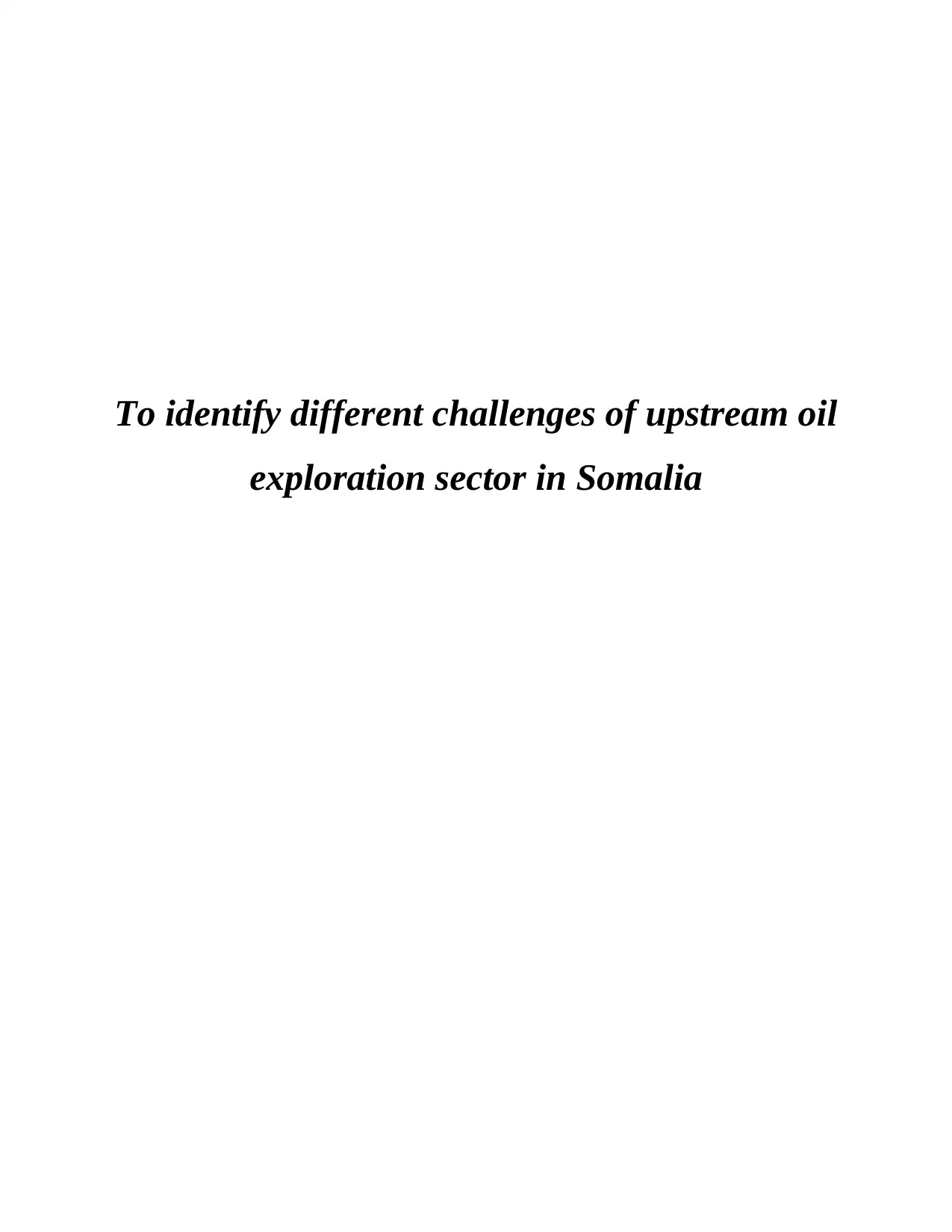
To identify different challenges of upstream oil
exploration sector in Somalia
exploration sector in Somalia
Paraphrase This Document
Need a fresh take? Get an instant paraphrase of this document with our AI Paraphraser
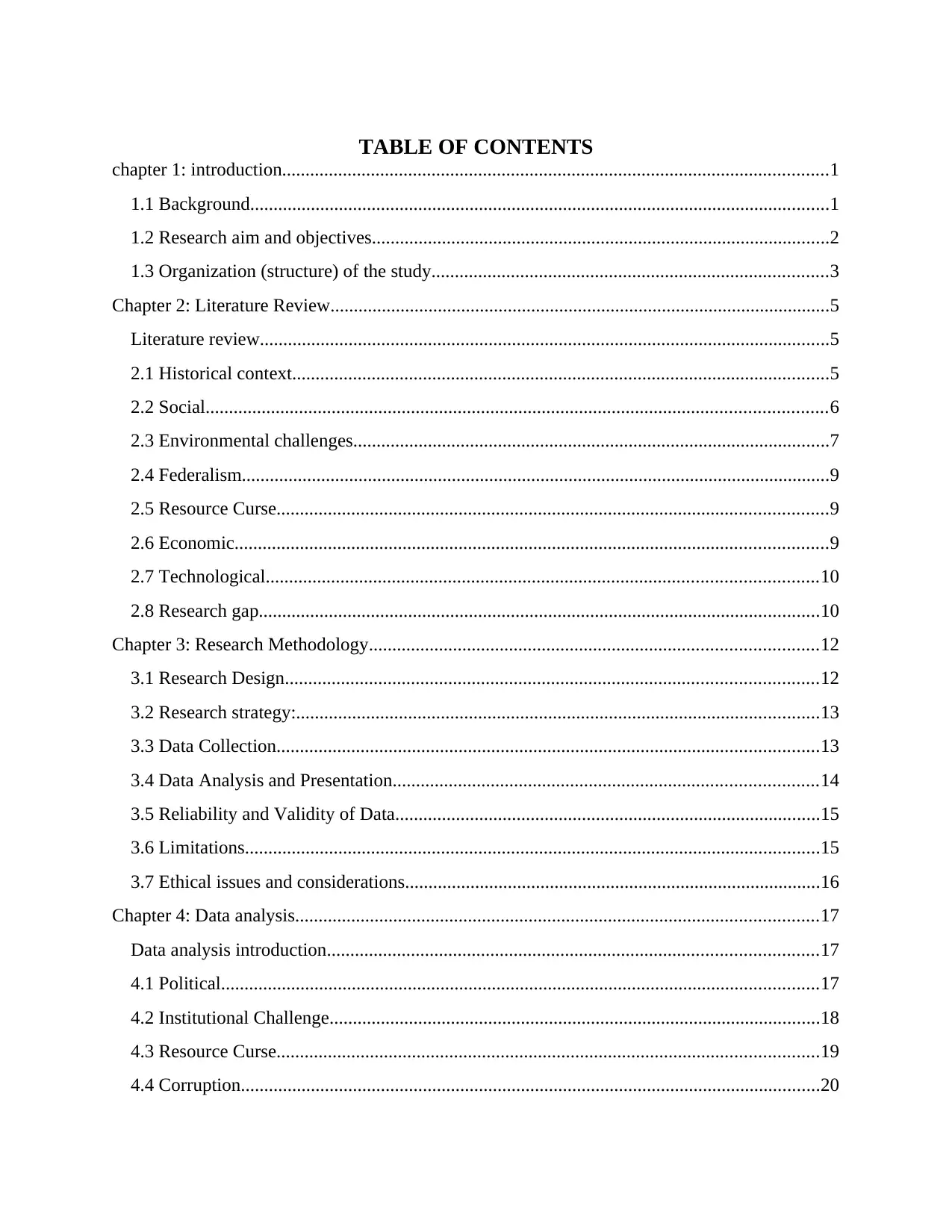
TABLE OF CONTENTS
chapter 1: introduction.....................................................................................................................1
1.1 Background............................................................................................................................1
1.2 Research aim and objectives..................................................................................................2
1.3 Organization (structure) of the study.....................................................................................3
Chapter 2: Literature Review...........................................................................................................5
Literature review..........................................................................................................................5
2.1 Historical context...................................................................................................................5
2.2 Social.....................................................................................................................................6
2.3 Environmental challenges......................................................................................................7
2.4 Federalism..............................................................................................................................9
2.5 Resource Curse......................................................................................................................9
2.6 Economic...............................................................................................................................9
2.7 Technological......................................................................................................................10
2.8 Research gap........................................................................................................................10
Chapter 3: Research Methodology................................................................................................12
3.1 Research Design..................................................................................................................12
3.2 Research strategy:................................................................................................................13
3.3 Data Collection....................................................................................................................13
3.4 Data Analysis and Presentation...........................................................................................14
3.5 Reliability and Validity of Data...........................................................................................15
3.6 Limitations...........................................................................................................................15
3.7 Ethical issues and considerations.........................................................................................16
Chapter 4: Data analysis................................................................................................................17
Data analysis introduction.........................................................................................................17
4.1 Political................................................................................................................................17
4.2 Institutional Challenge.........................................................................................................18
4.3 Resource Curse....................................................................................................................19
4.4 Corruption............................................................................................................................20
chapter 1: introduction.....................................................................................................................1
1.1 Background............................................................................................................................1
1.2 Research aim and objectives..................................................................................................2
1.3 Organization (structure) of the study.....................................................................................3
Chapter 2: Literature Review...........................................................................................................5
Literature review..........................................................................................................................5
2.1 Historical context...................................................................................................................5
2.2 Social.....................................................................................................................................6
2.3 Environmental challenges......................................................................................................7
2.4 Federalism..............................................................................................................................9
2.5 Resource Curse......................................................................................................................9
2.6 Economic...............................................................................................................................9
2.7 Technological......................................................................................................................10
2.8 Research gap........................................................................................................................10
Chapter 3: Research Methodology................................................................................................12
3.1 Research Design..................................................................................................................12
3.2 Research strategy:................................................................................................................13
3.3 Data Collection....................................................................................................................13
3.4 Data Analysis and Presentation...........................................................................................14
3.5 Reliability and Validity of Data...........................................................................................15
3.6 Limitations...........................................................................................................................15
3.7 Ethical issues and considerations.........................................................................................16
Chapter 4: Data analysis................................................................................................................17
Data analysis introduction.........................................................................................................17
4.1 Political................................................................................................................................17
4.2 Institutional Challenge.........................................................................................................18
4.3 Resource Curse....................................................................................................................19
4.4 Corruption............................................................................................................................20
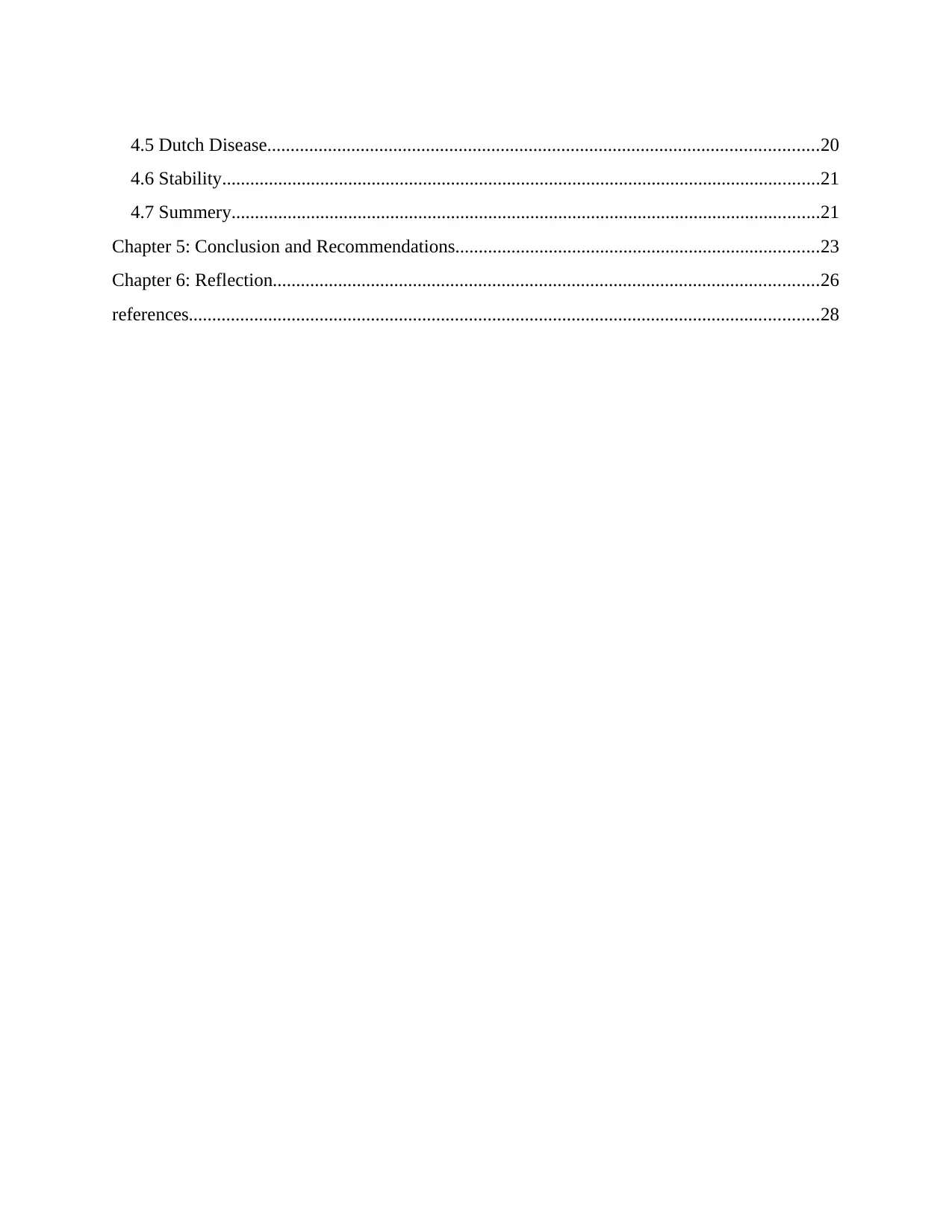
4.5 Dutch Disease......................................................................................................................20
4.6 Stability................................................................................................................................21
4.7 Summery..............................................................................................................................21
Chapter 5: Conclusion and Recommendations..............................................................................23
Chapter 6: Reflection.....................................................................................................................26
references.......................................................................................................................................28
4.6 Stability................................................................................................................................21
4.7 Summery..............................................................................................................................21
Chapter 5: Conclusion and Recommendations..............................................................................23
Chapter 6: Reflection.....................................................................................................................26
references.......................................................................................................................................28
⊘ This is a preview!⊘
Do you want full access?
Subscribe today to unlock all pages.

Trusted by 1+ million students worldwide
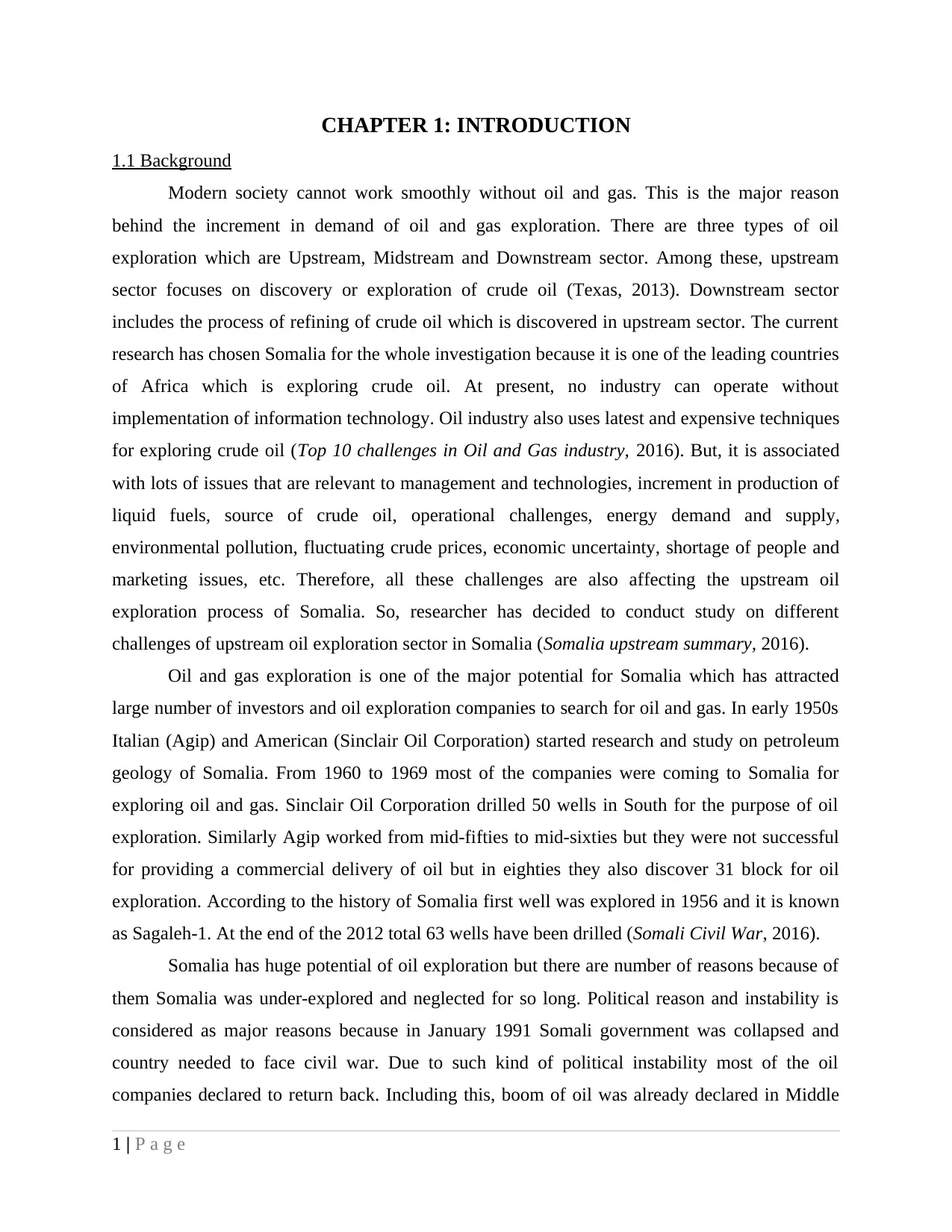
CHAPTER 1: INTRODUCTION
1.1 Background
Modern society cannot work smoothly without oil and gas. This is the major reason
behind the increment in demand of oil and gas exploration. There are three types of oil
exploration which are Upstream, Midstream and Downstream sector. Among these, upstream
sector focuses on discovery or exploration of crude oil (Texas, 2013). Downstream sector
includes the process of refining of crude oil which is discovered in upstream sector. The current
research has chosen Somalia for the whole investigation because it is one of the leading countries
of Africa which is exploring crude oil. At present, no industry can operate without
implementation of information technology. Oil industry also uses latest and expensive techniques
for exploring crude oil (Top 10 challenges in Oil and Gas industry, 2016). But, it is associated
with lots of issues that are relevant to management and technologies, increment in production of
liquid fuels, source of crude oil, operational challenges, energy demand and supply,
environmental pollution, fluctuating crude prices, economic uncertainty, shortage of people and
marketing issues, etc. Therefore, all these challenges are also affecting the upstream oil
exploration process of Somalia. So, researcher has decided to conduct study on different
challenges of upstream oil exploration sector in Somalia (Somalia upstream summary, 2016).
Oil and gas exploration is one of the major potential for Somalia which has attracted
large number of investors and oil exploration companies to search for oil and gas. In early 1950s
Italian (Agip) and American (Sinclair Oil Corporation) started research and study on petroleum
geology of Somalia. From 1960 to 1969 most of the companies were coming to Somalia for
exploring oil and gas. Sinclair Oil Corporation drilled 50 wells in South for the purpose of oil
exploration. Similarly Agip worked from mid-fifties to mid-sixties but they were not successful
for providing a commercial delivery of oil but in eighties they also discover 31 block for oil
exploration. According to the history of Somalia first well was explored in 1956 and it is known
as Sagaleh-1. At the end of the 2012 total 63 wells have been drilled (Somali Civil War, 2016).
Somalia has huge potential of oil exploration but there are number of reasons because of
them Somalia was under-explored and neglected for so long. Political reason and instability is
considered as major reasons because in January 1991 Somali government was collapsed and
country needed to face civil war. Due to such kind of political instability most of the oil
companies declared to return back. Including this, boom of oil was already declared in Middle
1 | P a g e
1.1 Background
Modern society cannot work smoothly without oil and gas. This is the major reason
behind the increment in demand of oil and gas exploration. There are three types of oil
exploration which are Upstream, Midstream and Downstream sector. Among these, upstream
sector focuses on discovery or exploration of crude oil (Texas, 2013). Downstream sector
includes the process of refining of crude oil which is discovered in upstream sector. The current
research has chosen Somalia for the whole investigation because it is one of the leading countries
of Africa which is exploring crude oil. At present, no industry can operate without
implementation of information technology. Oil industry also uses latest and expensive techniques
for exploring crude oil (Top 10 challenges in Oil and Gas industry, 2016). But, it is associated
with lots of issues that are relevant to management and technologies, increment in production of
liquid fuels, source of crude oil, operational challenges, energy demand and supply,
environmental pollution, fluctuating crude prices, economic uncertainty, shortage of people and
marketing issues, etc. Therefore, all these challenges are also affecting the upstream oil
exploration process of Somalia. So, researcher has decided to conduct study on different
challenges of upstream oil exploration sector in Somalia (Somalia upstream summary, 2016).
Oil and gas exploration is one of the major potential for Somalia which has attracted
large number of investors and oil exploration companies to search for oil and gas. In early 1950s
Italian (Agip) and American (Sinclair Oil Corporation) started research and study on petroleum
geology of Somalia. From 1960 to 1969 most of the companies were coming to Somalia for
exploring oil and gas. Sinclair Oil Corporation drilled 50 wells in South for the purpose of oil
exploration. Similarly Agip worked from mid-fifties to mid-sixties but they were not successful
for providing a commercial delivery of oil but in eighties they also discover 31 block for oil
exploration. According to the history of Somalia first well was explored in 1956 and it is known
as Sagaleh-1. At the end of the 2012 total 63 wells have been drilled (Somali Civil War, 2016).
Somalia has huge potential of oil exploration but there are number of reasons because of
them Somalia was under-explored and neglected for so long. Political reason and instability is
considered as major reasons because in January 1991 Somali government was collapsed and
country needed to face civil war. Due to such kind of political instability most of the oil
companies declared to return back. Including this, boom of oil was already declared in Middle
1 | P a g e
Paraphrase This Document
Need a fresh take? Get an instant paraphrase of this document with our AI Paraphraser
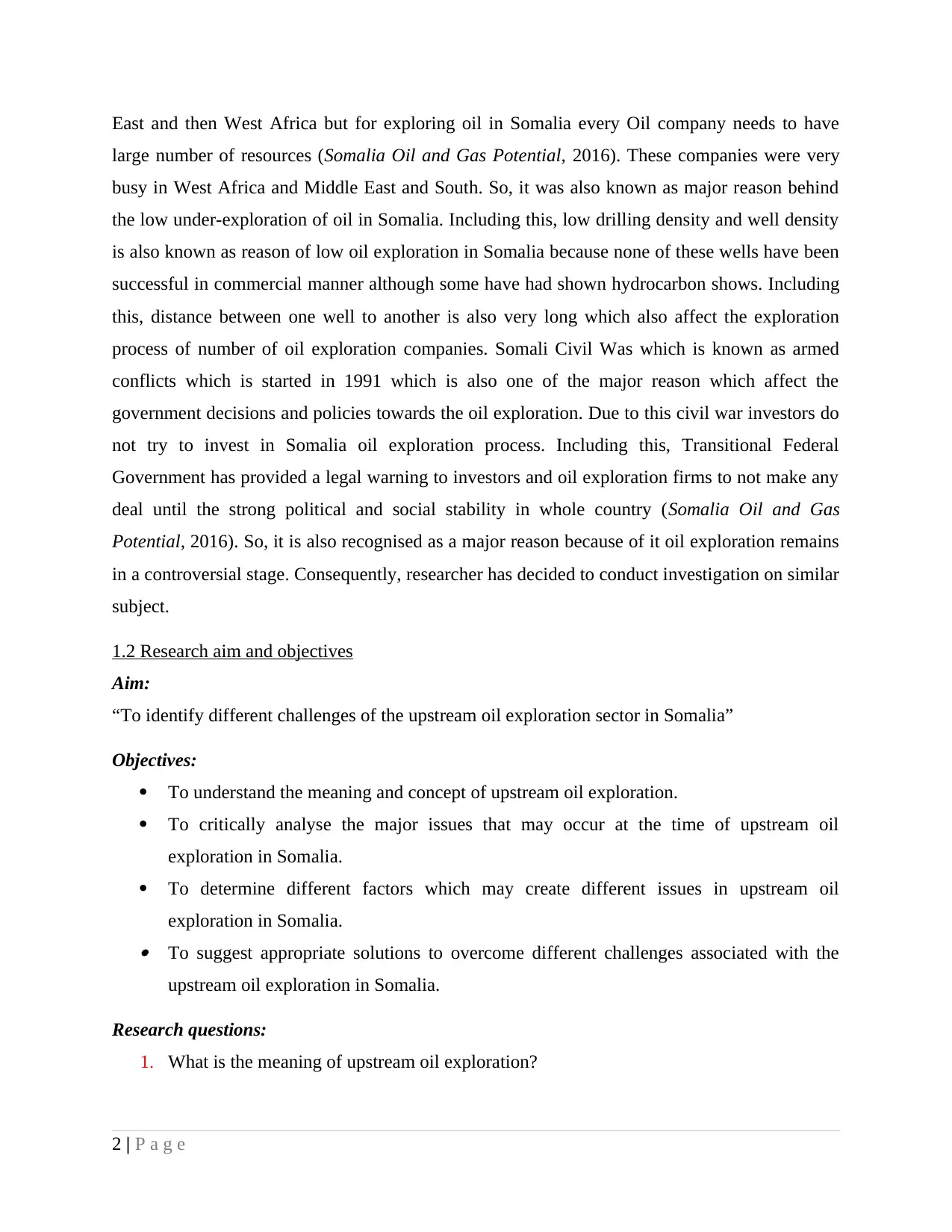
East and then West Africa but for exploring oil in Somalia every Oil company needs to have
large number of resources (Somalia Oil and Gas Potential, 2016). These companies were very
busy in West Africa and Middle East and South. So, it was also known as major reason behind
the low under-exploration of oil in Somalia. Including this, low drilling density and well density
is also known as reason of low oil exploration in Somalia because none of these wells have been
successful in commercial manner although some have had shown hydrocarbon shows. Including
this, distance between one well to another is also very long which also affect the exploration
process of number of oil exploration companies. Somali Civil Was which is known as armed
conflicts which is started in 1991 which is also one of the major reason which affect the
government decisions and policies towards the oil exploration. Due to this civil war investors do
not try to invest in Somalia oil exploration process. Including this, Transitional Federal
Government has provided a legal warning to investors and oil exploration firms to not make any
deal until the strong political and social stability in whole country (Somalia Oil and Gas
Potential, 2016). So, it is also recognised as a major reason because of it oil exploration remains
in a controversial stage. Consequently, researcher has decided to conduct investigation on similar
subject.
1.2 Research aim and objectives
Aim:
“To identify different challenges of the upstream oil exploration sector in Somalia”
Objectives:
To understand the meaning and concept of upstream oil exploration.
To critically analyse the major issues that may occur at the time of upstream oil
exploration in Somalia.
To determine different factors which may create different issues in upstream oil
exploration in Somalia. To suggest appropriate solutions to overcome different challenges associated with the
upstream oil exploration in Somalia.
Research questions:
1. What is the meaning of upstream oil exploration?
2 | P a g e
large number of resources (Somalia Oil and Gas Potential, 2016). These companies were very
busy in West Africa and Middle East and South. So, it was also known as major reason behind
the low under-exploration of oil in Somalia. Including this, low drilling density and well density
is also known as reason of low oil exploration in Somalia because none of these wells have been
successful in commercial manner although some have had shown hydrocarbon shows. Including
this, distance between one well to another is also very long which also affect the exploration
process of number of oil exploration companies. Somali Civil Was which is known as armed
conflicts which is started in 1991 which is also one of the major reason which affect the
government decisions and policies towards the oil exploration. Due to this civil war investors do
not try to invest in Somalia oil exploration process. Including this, Transitional Federal
Government has provided a legal warning to investors and oil exploration firms to not make any
deal until the strong political and social stability in whole country (Somalia Oil and Gas
Potential, 2016). So, it is also recognised as a major reason because of it oil exploration remains
in a controversial stage. Consequently, researcher has decided to conduct investigation on similar
subject.
1.2 Research aim and objectives
Aim:
“To identify different challenges of the upstream oil exploration sector in Somalia”
Objectives:
To understand the meaning and concept of upstream oil exploration.
To critically analyse the major issues that may occur at the time of upstream oil
exploration in Somalia.
To determine different factors which may create different issues in upstream oil
exploration in Somalia. To suggest appropriate solutions to overcome different challenges associated with the
upstream oil exploration in Somalia.
Research questions:
1. What is the meaning of upstream oil exploration?
2 | P a g e
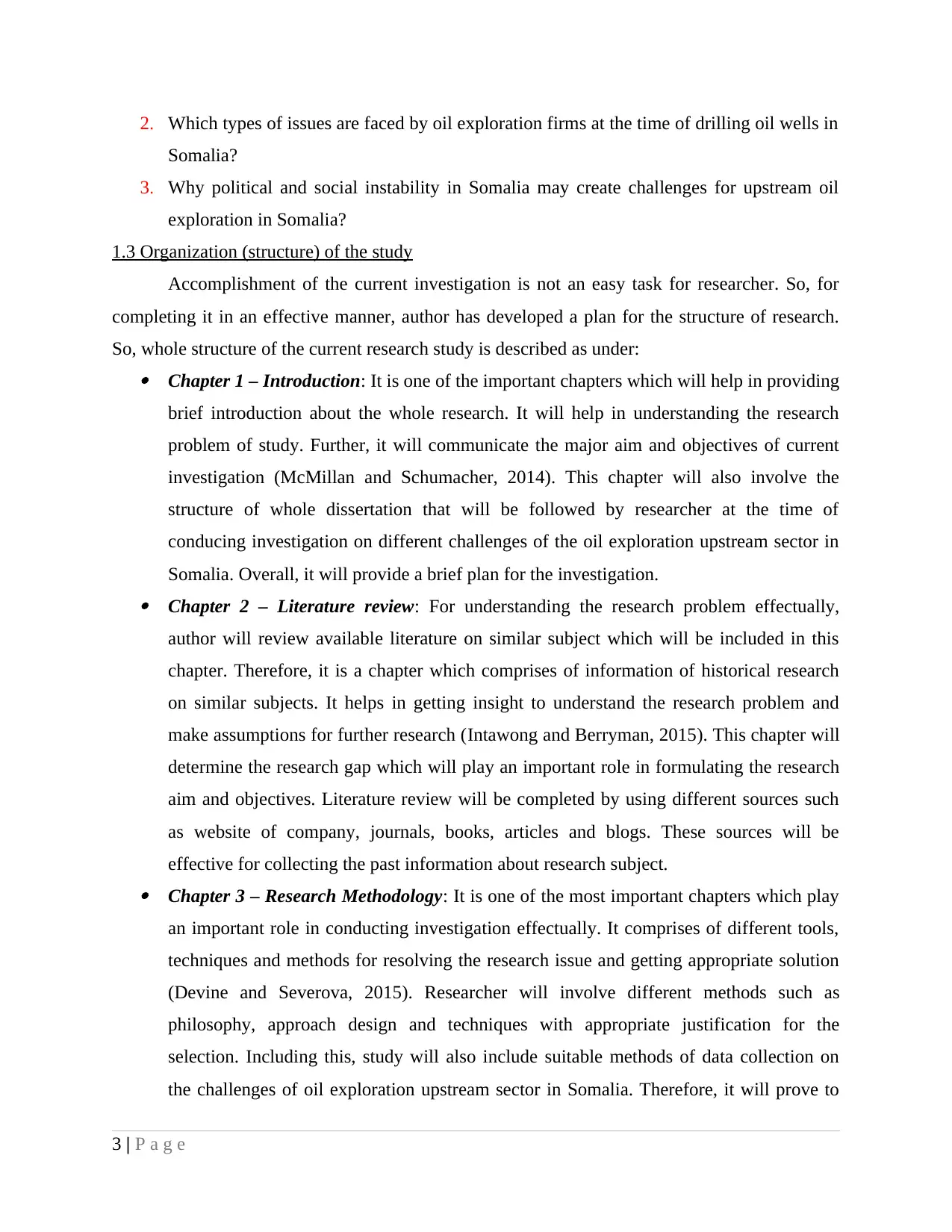
2. Which types of issues are faced by oil exploration firms at the time of drilling oil wells in
Somalia?
3. Why political and social instability in Somalia may create challenges for upstream oil
exploration in Somalia?
1.3 Organization (structure) of the study
Accomplishment of the current investigation is not an easy task for researcher. So, for
completing it in an effective manner, author has developed a plan for the structure of research.
So, whole structure of the current research study is described as under: Chapter 1 – Introduction: It is one of the important chapters which will help in providing
brief introduction about the whole research. It will help in understanding the research
problem of study. Further, it will communicate the major aim and objectives of current
investigation (McMillan and Schumacher, 2014). This chapter will also involve the
structure of whole dissertation that will be followed by researcher at the time of
conducing investigation on different challenges of the oil exploration upstream sector in
Somalia. Overall, it will provide a brief plan for the investigation. Chapter 2 – Literature review: For understanding the research problem effectually,
author will review available literature on similar subject which will be included in this
chapter. Therefore, it is a chapter which comprises of information of historical research
on similar subjects. It helps in getting insight to understand the research problem and
make assumptions for further research (Intawong and Berryman, 2015). This chapter will
determine the research gap which will play an important role in formulating the research
aim and objectives. Literature review will be completed by using different sources such
as website of company, journals, books, articles and blogs. These sources will be
effective for collecting the past information about research subject. Chapter 3 – Research Methodology: It is one of the most important chapters which play
an important role in conducting investigation effectually. It comprises of different tools,
techniques and methods for resolving the research issue and getting appropriate solution
(Devine and Severova, 2015). Researcher will involve different methods such as
philosophy, approach design and techniques with appropriate justification for the
selection. Including this, study will also include suitable methods of data collection on
the challenges of oil exploration upstream sector in Somalia. Therefore, it will prove to
3 | P a g e
Somalia?
3. Why political and social instability in Somalia may create challenges for upstream oil
exploration in Somalia?
1.3 Organization (structure) of the study
Accomplishment of the current investigation is not an easy task for researcher. So, for
completing it in an effective manner, author has developed a plan for the structure of research.
So, whole structure of the current research study is described as under: Chapter 1 – Introduction: It is one of the important chapters which will help in providing
brief introduction about the whole research. It will help in understanding the research
problem of study. Further, it will communicate the major aim and objectives of current
investigation (McMillan and Schumacher, 2014). This chapter will also involve the
structure of whole dissertation that will be followed by researcher at the time of
conducing investigation on different challenges of the oil exploration upstream sector in
Somalia. Overall, it will provide a brief plan for the investigation. Chapter 2 – Literature review: For understanding the research problem effectually,
author will review available literature on similar subject which will be included in this
chapter. Therefore, it is a chapter which comprises of information of historical research
on similar subjects. It helps in getting insight to understand the research problem and
make assumptions for further research (Intawong and Berryman, 2015). This chapter will
determine the research gap which will play an important role in formulating the research
aim and objectives. Literature review will be completed by using different sources such
as website of company, journals, books, articles and blogs. These sources will be
effective for collecting the past information about research subject. Chapter 3 – Research Methodology: It is one of the most important chapters which play
an important role in conducting investigation effectually. It comprises of different tools,
techniques and methods for resolving the research issue and getting appropriate solution
(Devine and Severova, 2015). Researcher will involve different methods such as
philosophy, approach design and techniques with appropriate justification for the
selection. Including this, study will also include suitable methods of data collection on
the challenges of oil exploration upstream sector in Somalia. Therefore, it will prove to
3 | P a g e
⊘ This is a preview!⊘
Do you want full access?
Subscribe today to unlock all pages.

Trusted by 1+ million students worldwide
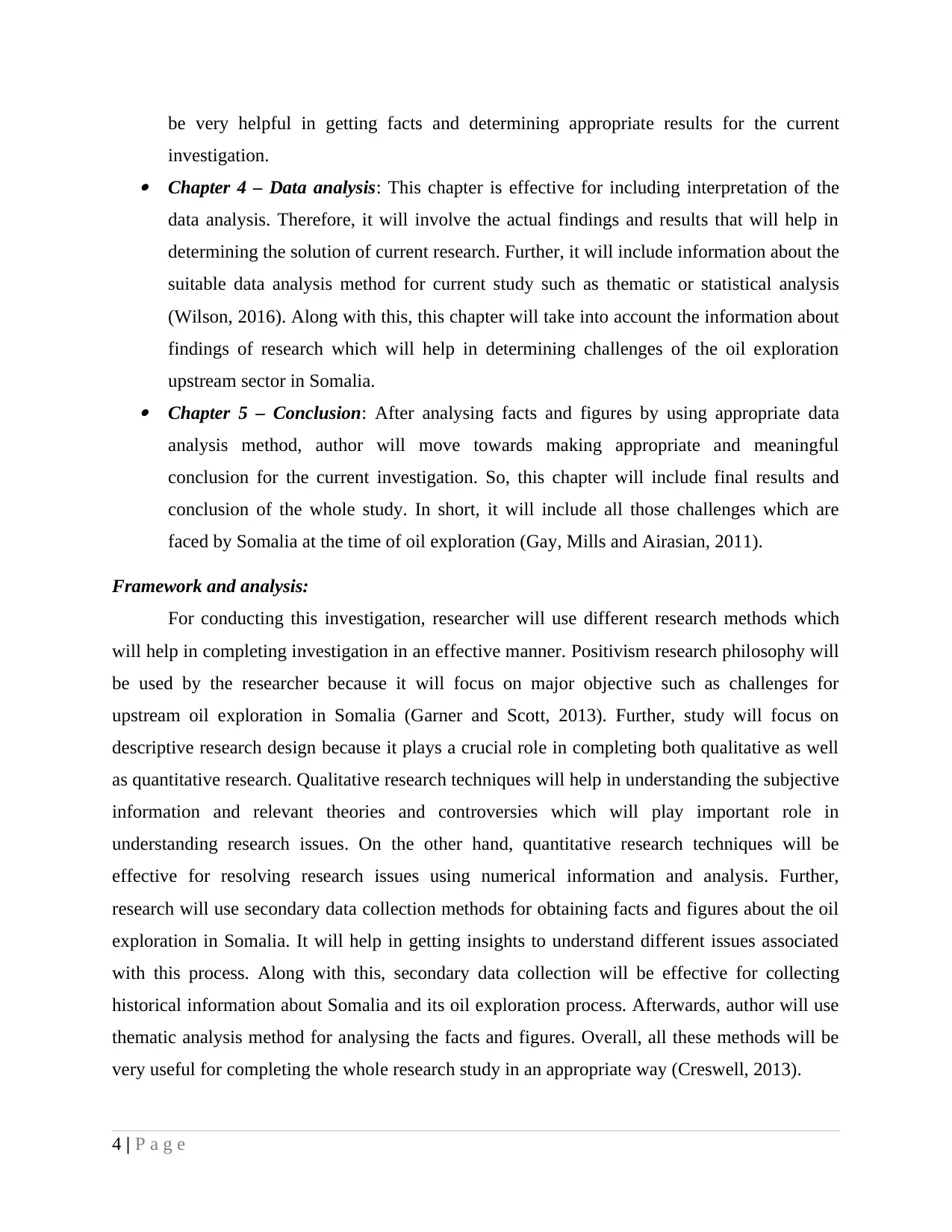
be very helpful in getting facts and determining appropriate results for the current
investigation. Chapter 4 – Data analysis: This chapter is effective for including interpretation of the
data analysis. Therefore, it will involve the actual findings and results that will help in
determining the solution of current research. Further, it will include information about the
suitable data analysis method for current study such as thematic or statistical analysis
(Wilson, 2016). Along with this, this chapter will take into account the information about
findings of research which will help in determining challenges of the oil exploration
upstream sector in Somalia. Chapter 5 – Conclusion: After analysing facts and figures by using appropriate data
analysis method, author will move towards making appropriate and meaningful
conclusion for the current investigation. So, this chapter will include final results and
conclusion of the whole study. In short, it will include all those challenges which are
faced by Somalia at the time of oil exploration (Gay, Mills and Airasian, 2011).
Framework and analysis:
For conducting this investigation, researcher will use different research methods which
will help in completing investigation in an effective manner. Positivism research philosophy will
be used by the researcher because it will focus on major objective such as challenges for
upstream oil exploration in Somalia (Garner and Scott, 2013). Further, study will focus on
descriptive research design because it plays a crucial role in completing both qualitative as well
as quantitative research. Qualitative research techniques will help in understanding the subjective
information and relevant theories and controversies which will play important role in
understanding research issues. On the other hand, quantitative research techniques will be
effective for resolving research issues using numerical information and analysis. Further,
research will use secondary data collection methods for obtaining facts and figures about the oil
exploration in Somalia. It will help in getting insights to understand different issues associated
with this process. Along with this, secondary data collection will be effective for collecting
historical information about Somalia and its oil exploration process. Afterwards, author will use
thematic analysis method for analysing the facts and figures. Overall, all these methods will be
very useful for completing the whole research study in an appropriate way (Creswell, 2013).
4 | P a g e
investigation. Chapter 4 – Data analysis: This chapter is effective for including interpretation of the
data analysis. Therefore, it will involve the actual findings and results that will help in
determining the solution of current research. Further, it will include information about the
suitable data analysis method for current study such as thematic or statistical analysis
(Wilson, 2016). Along with this, this chapter will take into account the information about
findings of research which will help in determining challenges of the oil exploration
upstream sector in Somalia. Chapter 5 – Conclusion: After analysing facts and figures by using appropriate data
analysis method, author will move towards making appropriate and meaningful
conclusion for the current investigation. So, this chapter will include final results and
conclusion of the whole study. In short, it will include all those challenges which are
faced by Somalia at the time of oil exploration (Gay, Mills and Airasian, 2011).
Framework and analysis:
For conducting this investigation, researcher will use different research methods which
will help in completing investigation in an effective manner. Positivism research philosophy will
be used by the researcher because it will focus on major objective such as challenges for
upstream oil exploration in Somalia (Garner and Scott, 2013). Further, study will focus on
descriptive research design because it plays a crucial role in completing both qualitative as well
as quantitative research. Qualitative research techniques will help in understanding the subjective
information and relevant theories and controversies which will play important role in
understanding research issues. On the other hand, quantitative research techniques will be
effective for resolving research issues using numerical information and analysis. Further,
research will use secondary data collection methods for obtaining facts and figures about the oil
exploration in Somalia. It will help in getting insights to understand different issues associated
with this process. Along with this, secondary data collection will be effective for collecting
historical information about Somalia and its oil exploration process. Afterwards, author will use
thematic analysis method for analysing the facts and figures. Overall, all these methods will be
very useful for completing the whole research study in an appropriate way (Creswell, 2013).
4 | P a g e
Paraphrase This Document
Need a fresh take? Get an instant paraphrase of this document with our AI Paraphraser
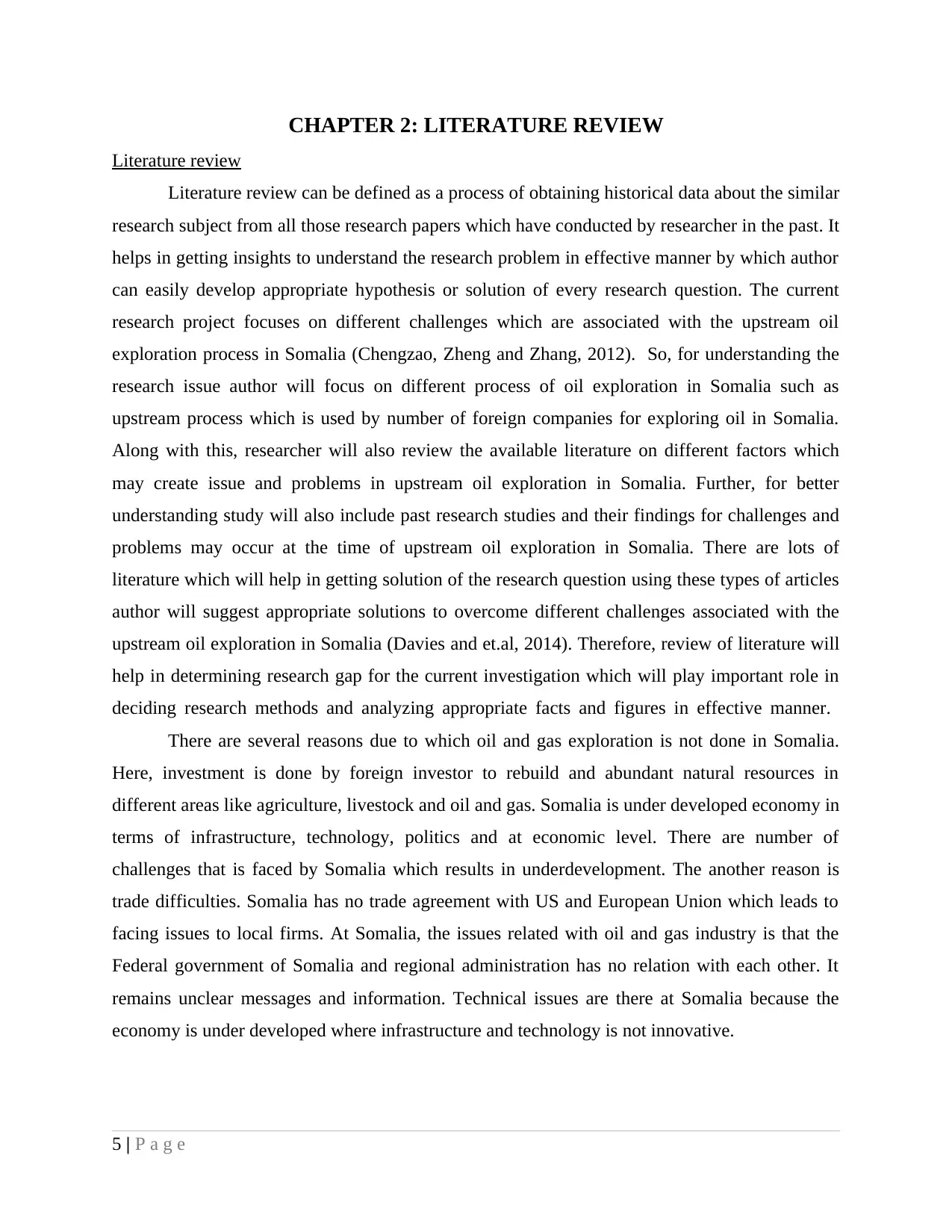
CHAPTER 2: LITERATURE REVIEW
Literature review
Literature review can be defined as a process of obtaining historical data about the similar
research subject from all those research papers which have conducted by researcher in the past. It
helps in getting insights to understand the research problem in effective manner by which author
can easily develop appropriate hypothesis or solution of every research question. The current
research project focuses on different challenges which are associated with the upstream oil
exploration process in Somalia (Chengzao, Zheng and Zhang, 2012). So, for understanding the
research issue author will focus on different process of oil exploration in Somalia such as
upstream process which is used by number of foreign companies for exploring oil in Somalia.
Along with this, researcher will also review the available literature on different factors which
may create issue and problems in upstream oil exploration in Somalia. Further, for better
understanding study will also include past research studies and their findings for challenges and
problems may occur at the time of upstream oil exploration in Somalia. There are lots of
literature which will help in getting solution of the research question using these types of articles
author will suggest appropriate solutions to overcome different challenges associated with the
upstream oil exploration in Somalia (Davies and et.al, 2014). Therefore, review of literature will
help in determining research gap for the current investigation which will play important role in
deciding research methods and analyzing appropriate facts and figures in effective manner.
There are several reasons due to which oil and gas exploration is not done in Somalia.
Here, investment is done by foreign investor to rebuild and abundant natural resources in
different areas like agriculture, livestock and oil and gas. Somalia is under developed economy in
terms of infrastructure, technology, politics and at economic level. There are number of
challenges that is faced by Somalia which results in underdevelopment. The another reason is
trade difficulties. Somalia has no trade agreement with US and European Union which leads to
facing issues to local firms. At Somalia, the issues related with oil and gas industry is that the
Federal government of Somalia and regional administration has no relation with each other. It
remains unclear messages and information. Technical issues are there at Somalia because the
economy is under developed where infrastructure and technology is not innovative.
5 | P a g e
Literature review
Literature review can be defined as a process of obtaining historical data about the similar
research subject from all those research papers which have conducted by researcher in the past. It
helps in getting insights to understand the research problem in effective manner by which author
can easily develop appropriate hypothesis or solution of every research question. The current
research project focuses on different challenges which are associated with the upstream oil
exploration process in Somalia (Chengzao, Zheng and Zhang, 2012). So, for understanding the
research issue author will focus on different process of oil exploration in Somalia such as
upstream process which is used by number of foreign companies for exploring oil in Somalia.
Along with this, researcher will also review the available literature on different factors which
may create issue and problems in upstream oil exploration in Somalia. Further, for better
understanding study will also include past research studies and their findings for challenges and
problems may occur at the time of upstream oil exploration in Somalia. There are lots of
literature which will help in getting solution of the research question using these types of articles
author will suggest appropriate solutions to overcome different challenges associated with the
upstream oil exploration in Somalia (Davies and et.al, 2014). Therefore, review of literature will
help in determining research gap for the current investigation which will play important role in
deciding research methods and analyzing appropriate facts and figures in effective manner.
There are several reasons due to which oil and gas exploration is not done in Somalia.
Here, investment is done by foreign investor to rebuild and abundant natural resources in
different areas like agriculture, livestock and oil and gas. Somalia is under developed economy in
terms of infrastructure, technology, politics and at economic level. There are number of
challenges that is faced by Somalia which results in underdevelopment. The another reason is
trade difficulties. Somalia has no trade agreement with US and European Union which leads to
facing issues to local firms. At Somalia, the issues related with oil and gas industry is that the
Federal government of Somalia and regional administration has no relation with each other. It
remains unclear messages and information. Technical issues are there at Somalia because the
economy is under developed where infrastructure and technology is not innovative.
5 | P a g e
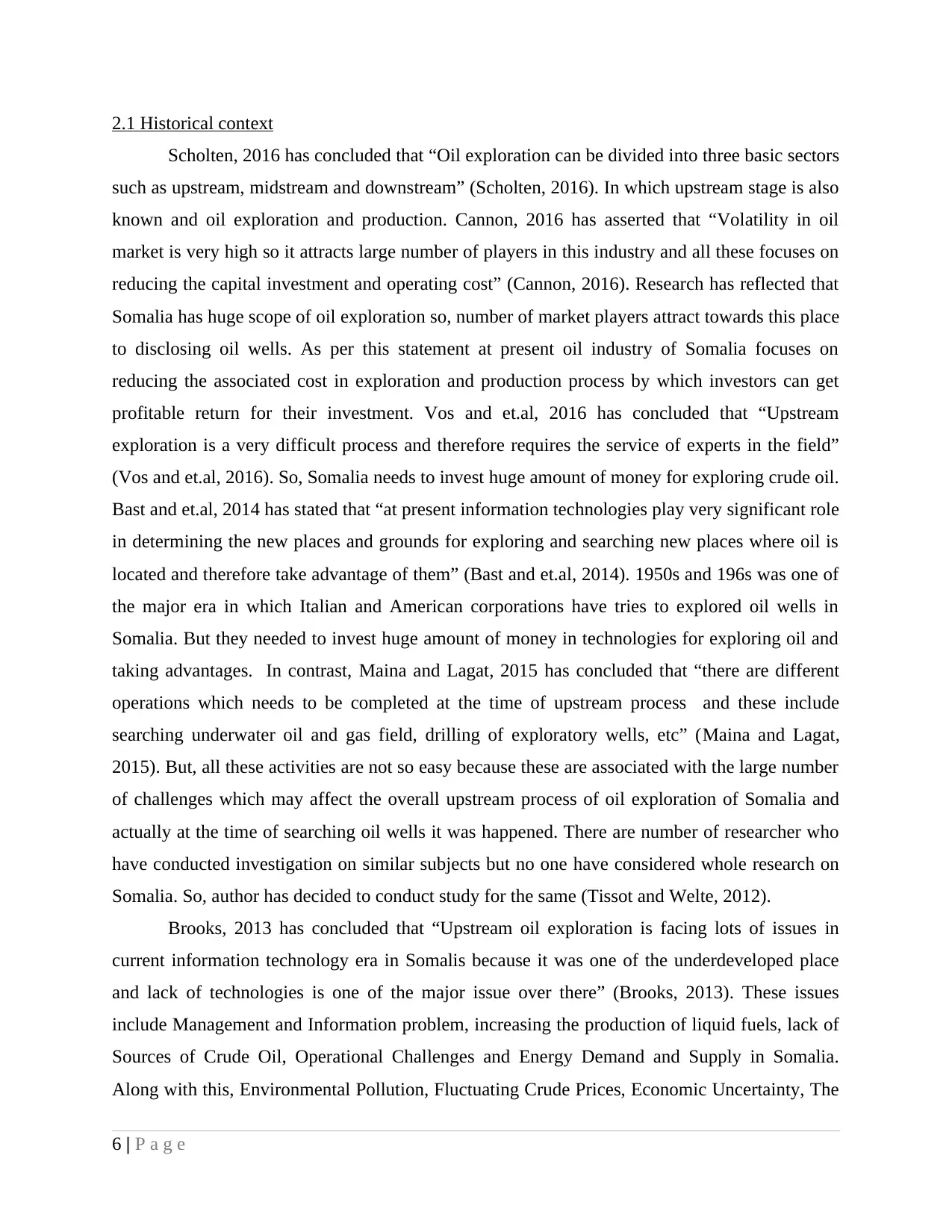
2.1 Historical context
Scholten, 2016 has concluded that “Oil exploration can be divided into three basic sectors
such as upstream, midstream and downstream” (Scholten, 2016). In which upstream stage is also
known and oil exploration and production. Cannon, 2016 has asserted that “Volatility in oil
market is very high so it attracts large number of players in this industry and all these focuses on
reducing the capital investment and operating cost” (Cannon, 2016). Research has reflected that
Somalia has huge scope of oil exploration so, number of market players attract towards this place
to disclosing oil wells. As per this statement at present oil industry of Somalia focuses on
reducing the associated cost in exploration and production process by which investors can get
profitable return for their investment. Vos and et.al, 2016 has concluded that “Upstream
exploration is a very difficult process and therefore requires the service of experts in the field”
(Vos and et.al, 2016). So, Somalia needs to invest huge amount of money for exploring crude oil.
Bast and et.al, 2014 has stated that “at present information technologies play very significant role
in determining the new places and grounds for exploring and searching new places where oil is
located and therefore take advantage of them” (Bast and et.al, 2014). 1950s and 196s was one of
the major era in which Italian and American corporations have tries to explored oil wells in
Somalia. But they needed to invest huge amount of money in technologies for exploring oil and
taking advantages. In contrast, Maina and Lagat, 2015 has concluded that “there are different
operations which needs to be completed at the time of upstream process and these include
searching underwater oil and gas field, drilling of exploratory wells, etc” (Maina and Lagat,
2015). But, all these activities are not so easy because these are associated with the large number
of challenges which may affect the overall upstream process of oil exploration of Somalia and
actually at the time of searching oil wells it was happened. There are number of researcher who
have conducted investigation on similar subjects but no one have considered whole research on
Somalia. So, author has decided to conduct study for the same (Tissot and Welte, 2012).
Brooks, 2013 has concluded that “Upstream oil exploration is facing lots of issues in
current information technology era in Somalis because it was one of the underdeveloped place
and lack of technologies is one of the major issue over there” (Brooks, 2013). These issues
include Management and Information problem, increasing the production of liquid fuels, lack of
Sources of Crude Oil, Operational Challenges and Energy Demand and Supply in Somalia.
Along with this, Environmental Pollution, Fluctuating Crude Prices, Economic Uncertainty, The
6 | P a g e
Scholten, 2016 has concluded that “Oil exploration can be divided into three basic sectors
such as upstream, midstream and downstream” (Scholten, 2016). In which upstream stage is also
known and oil exploration and production. Cannon, 2016 has asserted that “Volatility in oil
market is very high so it attracts large number of players in this industry and all these focuses on
reducing the capital investment and operating cost” (Cannon, 2016). Research has reflected that
Somalia has huge scope of oil exploration so, number of market players attract towards this place
to disclosing oil wells. As per this statement at present oil industry of Somalia focuses on
reducing the associated cost in exploration and production process by which investors can get
profitable return for their investment. Vos and et.al, 2016 has concluded that “Upstream
exploration is a very difficult process and therefore requires the service of experts in the field”
(Vos and et.al, 2016). So, Somalia needs to invest huge amount of money for exploring crude oil.
Bast and et.al, 2014 has stated that “at present information technologies play very significant role
in determining the new places and grounds for exploring and searching new places where oil is
located and therefore take advantage of them” (Bast and et.al, 2014). 1950s and 196s was one of
the major era in which Italian and American corporations have tries to explored oil wells in
Somalia. But they needed to invest huge amount of money in technologies for exploring oil and
taking advantages. In contrast, Maina and Lagat, 2015 has concluded that “there are different
operations which needs to be completed at the time of upstream process and these include
searching underwater oil and gas field, drilling of exploratory wells, etc” (Maina and Lagat,
2015). But, all these activities are not so easy because these are associated with the large number
of challenges which may affect the overall upstream process of oil exploration of Somalia and
actually at the time of searching oil wells it was happened. There are number of researcher who
have conducted investigation on similar subjects but no one have considered whole research on
Somalia. So, author has decided to conduct study for the same (Tissot and Welte, 2012).
Brooks, 2013 has concluded that “Upstream oil exploration is facing lots of issues in
current information technology era in Somalis because it was one of the underdeveloped place
and lack of technologies is one of the major issue over there” (Brooks, 2013). These issues
include Management and Information problem, increasing the production of liquid fuels, lack of
Sources of Crude Oil, Operational Challenges and Energy Demand and Supply in Somalia.
Along with this, Environmental Pollution, Fluctuating Crude Prices, Economic Uncertainty, The
6 | P a g e
⊘ This is a preview!⊘
Do you want full access?
Subscribe today to unlock all pages.

Trusted by 1+ million students worldwide
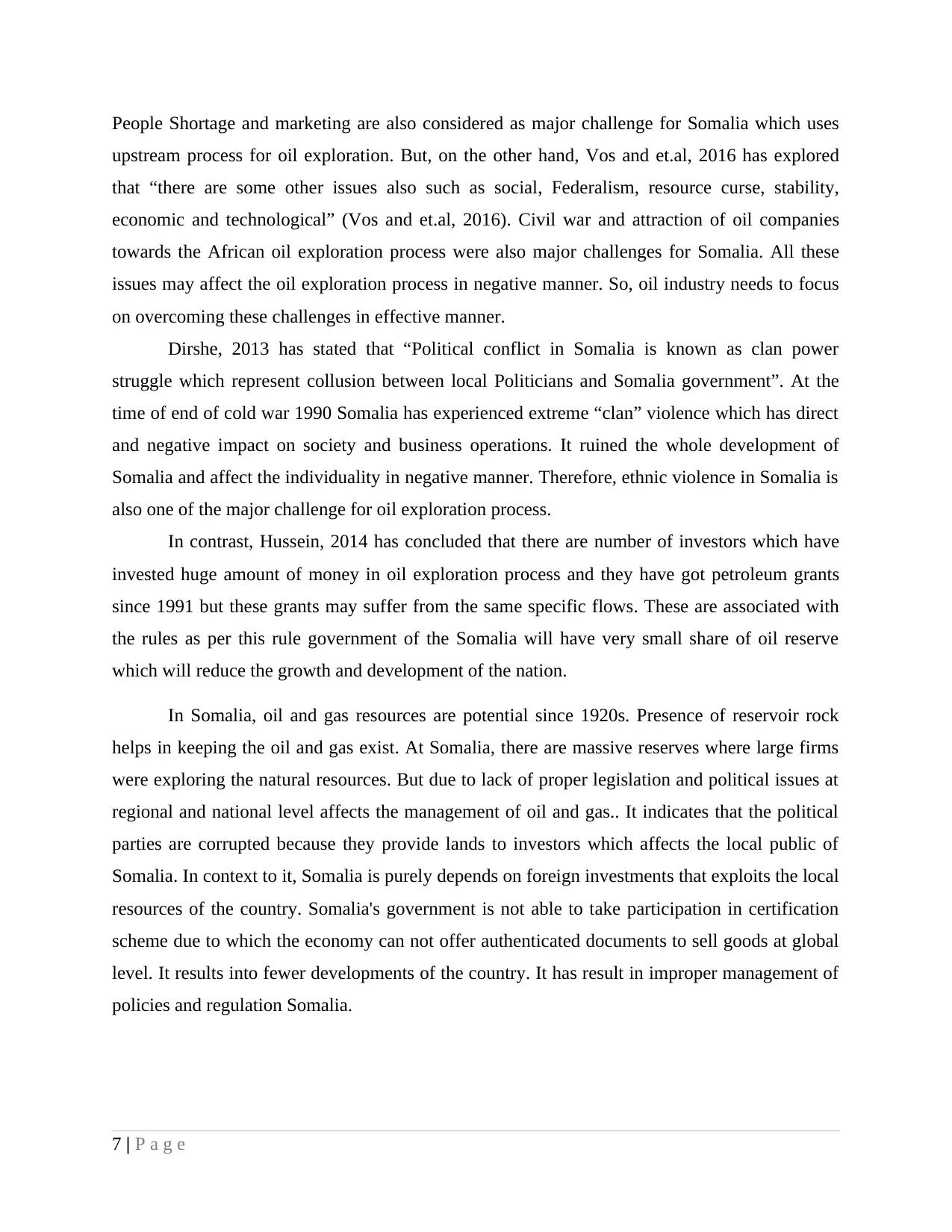
People Shortage and marketing are also considered as major challenge for Somalia which uses
upstream process for oil exploration. But, on the other hand, Vos and et.al, 2016 has explored
that “there are some other issues also such as social, Federalism, resource curse, stability,
economic and technological” (Vos and et.al, 2016). Civil war and attraction of oil companies
towards the African oil exploration process were also major challenges for Somalia. All these
issues may affect the oil exploration process in negative manner. So, oil industry needs to focus
on overcoming these challenges in effective manner.
Dirshe, 2013 has stated that “Political conflict in Somalia is known as clan power
struggle which represent collusion between local Politicians and Somalia government”. At the
time of end of cold war 1990 Somalia has experienced extreme “clan” violence which has direct
and negative impact on society and business operations. It ruined the whole development of
Somalia and affect the individuality in negative manner. Therefore, ethnic violence in Somalia is
also one of the major challenge for oil exploration process.
In contrast, Hussein, 2014 has concluded that there are number of investors which have
invested huge amount of money in oil exploration process and they have got petroleum grants
since 1991 but these grants may suffer from the same specific flows. These are associated with
the rules as per this rule government of the Somalia will have very small share of oil reserve
which will reduce the growth and development of the nation.
In Somalia, oil and gas resources are potential since 1920s. Presence of reservoir rock
helps in keeping the oil and gas exist. At Somalia, there are massive reserves where large firms
were exploring the natural resources. But due to lack of proper legislation and political issues at
regional and national level affects the management of oil and gas.. It indicates that the political
parties are corrupted because they provide lands to investors which affects the local public of
Somalia. In context to it, Somalia is purely depends on foreign investments that exploits the local
resources of the country. Somalia's government is not able to take participation in certification
scheme due to which the economy can not offer authenticated documents to sell goods at global
level. It results into fewer developments of the country. It has result in improper management of
policies and regulation Somalia.
7 | P a g e
upstream process for oil exploration. But, on the other hand, Vos and et.al, 2016 has explored
that “there are some other issues also such as social, Federalism, resource curse, stability,
economic and technological” (Vos and et.al, 2016). Civil war and attraction of oil companies
towards the African oil exploration process were also major challenges for Somalia. All these
issues may affect the oil exploration process in negative manner. So, oil industry needs to focus
on overcoming these challenges in effective manner.
Dirshe, 2013 has stated that “Political conflict in Somalia is known as clan power
struggle which represent collusion between local Politicians and Somalia government”. At the
time of end of cold war 1990 Somalia has experienced extreme “clan” violence which has direct
and negative impact on society and business operations. It ruined the whole development of
Somalia and affect the individuality in negative manner. Therefore, ethnic violence in Somalia is
also one of the major challenge for oil exploration process.
In contrast, Hussein, 2014 has concluded that there are number of investors which have
invested huge amount of money in oil exploration process and they have got petroleum grants
since 1991 but these grants may suffer from the same specific flows. These are associated with
the rules as per this rule government of the Somalia will have very small share of oil reserve
which will reduce the growth and development of the nation.
In Somalia, oil and gas resources are potential since 1920s. Presence of reservoir rock
helps in keeping the oil and gas exist. At Somalia, there are massive reserves where large firms
were exploring the natural resources. But due to lack of proper legislation and political issues at
regional and national level affects the management of oil and gas.. It indicates that the political
parties are corrupted because they provide lands to investors which affects the local public of
Somalia. In context to it, Somalia is purely depends on foreign investments that exploits the local
resources of the country. Somalia's government is not able to take participation in certification
scheme due to which the economy can not offer authenticated documents to sell goods at global
level. It results into fewer developments of the country. It has result in improper management of
policies and regulation Somalia.
7 | P a g e
Paraphrase This Document
Need a fresh take? Get an instant paraphrase of this document with our AI Paraphraser
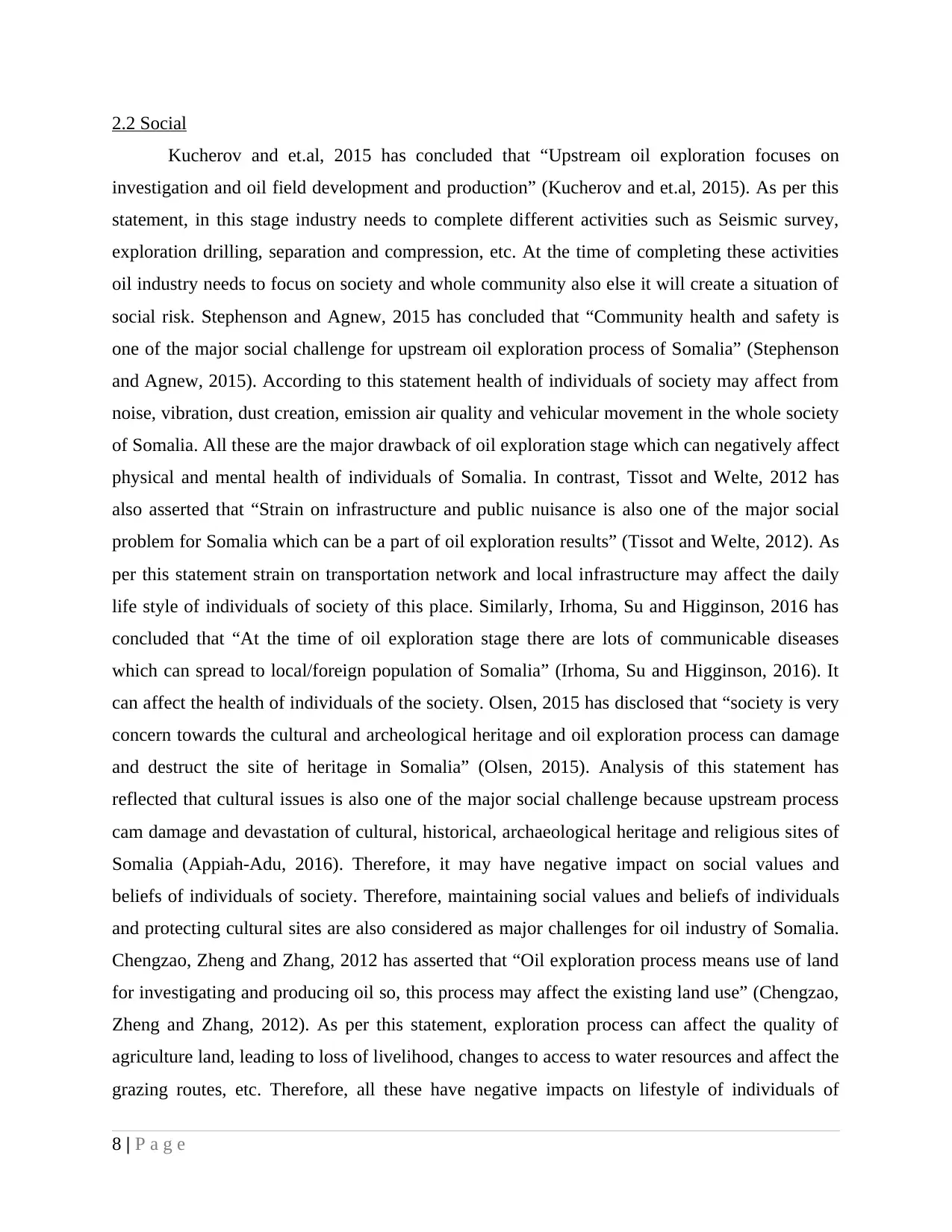
2.2 Social
Kucherov and et.al, 2015 has concluded that “Upstream oil exploration focuses on
investigation and oil field development and production” (Kucherov and et.al, 2015). As per this
statement, in this stage industry needs to complete different activities such as Seismic survey,
exploration drilling, separation and compression, etc. At the time of completing these activities
oil industry needs to focus on society and whole community also else it will create a situation of
social risk. Stephenson and Agnew, 2015 has concluded that “Community health and safety is
one of the major social challenge for upstream oil exploration process of Somalia” (Stephenson
and Agnew, 2015). According to this statement health of individuals of society may affect from
noise, vibration, dust creation, emission air quality and vehicular movement in the whole society
of Somalia. All these are the major drawback of oil exploration stage which can negatively affect
physical and mental health of individuals of Somalia. In contrast, Tissot and Welte, 2012 has
also asserted that “Strain on infrastructure and public nuisance is also one of the major social
problem for Somalia which can be a part of oil exploration results” (Tissot and Welte, 2012). As
per this statement strain on transportation network and local infrastructure may affect the daily
life style of individuals of society of this place. Similarly, Irhoma, Su and Higginson, 2016 has
concluded that “At the time of oil exploration stage there are lots of communicable diseases
which can spread to local/foreign population of Somalia” (Irhoma, Su and Higginson, 2016). It
can affect the health of individuals of the society. Olsen, 2015 has disclosed that “society is very
concern towards the cultural and archeological heritage and oil exploration process can damage
and destruct the site of heritage in Somalia” (Olsen, 2015). Analysis of this statement has
reflected that cultural issues is also one of the major social challenge because upstream process
cam damage and devastation of cultural, historical, archaeological heritage and religious sites of
Somalia (Appiah-Adu, 2016). Therefore, it may have negative impact on social values and
beliefs of individuals of society. Therefore, maintaining social values and beliefs of individuals
and protecting cultural sites are also considered as major challenges for oil industry of Somalia.
Chengzao, Zheng and Zhang, 2012 has asserted that “Oil exploration process means use of land
for investigating and producing oil so, this process may affect the existing land use” (Chengzao,
Zheng and Zhang, 2012). As per this statement, exploration process can affect the quality of
agriculture land, leading to loss of livelihood, changes to access to water resources and affect the
grazing routes, etc. Therefore, all these have negative impacts on lifestyle of individuals of
8 | P a g e
Kucherov and et.al, 2015 has concluded that “Upstream oil exploration focuses on
investigation and oil field development and production” (Kucherov and et.al, 2015). As per this
statement, in this stage industry needs to complete different activities such as Seismic survey,
exploration drilling, separation and compression, etc. At the time of completing these activities
oil industry needs to focus on society and whole community also else it will create a situation of
social risk. Stephenson and Agnew, 2015 has concluded that “Community health and safety is
one of the major social challenge for upstream oil exploration process of Somalia” (Stephenson
and Agnew, 2015). According to this statement health of individuals of society may affect from
noise, vibration, dust creation, emission air quality and vehicular movement in the whole society
of Somalia. All these are the major drawback of oil exploration stage which can negatively affect
physical and mental health of individuals of Somalia. In contrast, Tissot and Welte, 2012 has
also asserted that “Strain on infrastructure and public nuisance is also one of the major social
problem for Somalia which can be a part of oil exploration results” (Tissot and Welte, 2012). As
per this statement strain on transportation network and local infrastructure may affect the daily
life style of individuals of society of this place. Similarly, Irhoma, Su and Higginson, 2016 has
concluded that “At the time of oil exploration stage there are lots of communicable diseases
which can spread to local/foreign population of Somalia” (Irhoma, Su and Higginson, 2016). It
can affect the health of individuals of the society. Olsen, 2015 has disclosed that “society is very
concern towards the cultural and archeological heritage and oil exploration process can damage
and destruct the site of heritage in Somalia” (Olsen, 2015). Analysis of this statement has
reflected that cultural issues is also one of the major social challenge because upstream process
cam damage and devastation of cultural, historical, archaeological heritage and religious sites of
Somalia (Appiah-Adu, 2016). Therefore, it may have negative impact on social values and
beliefs of individuals of society. Therefore, maintaining social values and beliefs of individuals
and protecting cultural sites are also considered as major challenges for oil industry of Somalia.
Chengzao, Zheng and Zhang, 2012 has asserted that “Oil exploration process means use of land
for investigating and producing oil so, this process may affect the existing land use” (Chengzao,
Zheng and Zhang, 2012). As per this statement, exploration process can affect the quality of
agriculture land, leading to loss of livelihood, changes to access to water resources and affect the
grazing routes, etc. Therefore, all these have negative impacts on lifestyle of individuals of
8 | P a g e
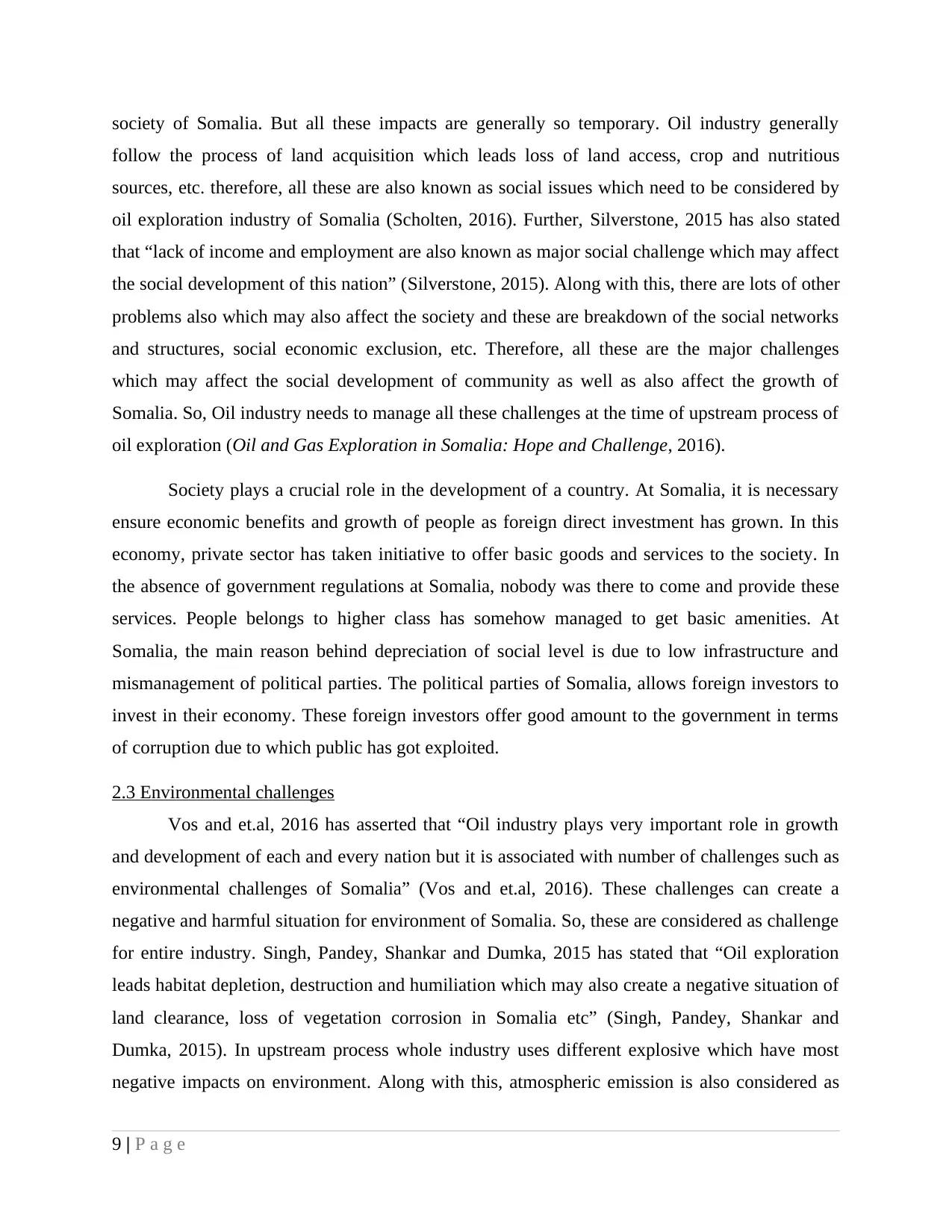
society of Somalia. But all these impacts are generally so temporary. Oil industry generally
follow the process of land acquisition which leads loss of land access, crop and nutritious
sources, etc. therefore, all these are also known as social issues which need to be considered by
oil exploration industry of Somalia (Scholten, 2016). Further, Silverstone, 2015 has also stated
that “lack of income and employment are also known as major social challenge which may affect
the social development of this nation” (Silverstone, 2015). Along with this, there are lots of other
problems also which may also affect the society and these are breakdown of the social networks
and structures, social economic exclusion, etc. Therefore, all these are the major challenges
which may affect the social development of community as well as also affect the growth of
Somalia. So, Oil industry needs to manage all these challenges at the time of upstream process of
oil exploration (Oil and Gas Exploration in Somalia: Hope and Challenge, 2016).
Society plays a crucial role in the development of a country. At Somalia, it is necessary
ensure economic benefits and growth of people as foreign direct investment has grown. In this
economy, private sector has taken initiative to offer basic goods and services to the society. In
the absence of government regulations at Somalia, nobody was there to come and provide these
services. People belongs to higher class has somehow managed to get basic amenities. At
Somalia, the main reason behind depreciation of social level is due to low infrastructure and
mismanagement of political parties. The political parties of Somalia, allows foreign investors to
invest in their economy. These foreign investors offer good amount to the government in terms
of corruption due to which public has got exploited.
2.3 Environmental challenges
Vos and et.al, 2016 has asserted that “Oil industry plays very important role in growth
and development of each and every nation but it is associated with number of challenges such as
environmental challenges of Somalia” (Vos and et.al, 2016). These challenges can create a
negative and harmful situation for environment of Somalia. So, these are considered as challenge
for entire industry. Singh, Pandey, Shankar and Dumka, 2015 has stated that “Oil exploration
leads habitat depletion, destruction and humiliation which may also create a negative situation of
land clearance, loss of vegetation corrosion in Somalia etc” (Singh, Pandey, Shankar and
Dumka, 2015). In upstream process whole industry uses different explosive which have most
negative impacts on environment. Along with this, atmospheric emission is also considered as
9 | P a g e
follow the process of land acquisition which leads loss of land access, crop and nutritious
sources, etc. therefore, all these are also known as social issues which need to be considered by
oil exploration industry of Somalia (Scholten, 2016). Further, Silverstone, 2015 has also stated
that “lack of income and employment are also known as major social challenge which may affect
the social development of this nation” (Silverstone, 2015). Along with this, there are lots of other
problems also which may also affect the society and these are breakdown of the social networks
and structures, social economic exclusion, etc. Therefore, all these are the major challenges
which may affect the social development of community as well as also affect the growth of
Somalia. So, Oil industry needs to manage all these challenges at the time of upstream process of
oil exploration (Oil and Gas Exploration in Somalia: Hope and Challenge, 2016).
Society plays a crucial role in the development of a country. At Somalia, it is necessary
ensure economic benefits and growth of people as foreign direct investment has grown. In this
economy, private sector has taken initiative to offer basic goods and services to the society. In
the absence of government regulations at Somalia, nobody was there to come and provide these
services. People belongs to higher class has somehow managed to get basic amenities. At
Somalia, the main reason behind depreciation of social level is due to low infrastructure and
mismanagement of political parties. The political parties of Somalia, allows foreign investors to
invest in their economy. These foreign investors offer good amount to the government in terms
of corruption due to which public has got exploited.
2.3 Environmental challenges
Vos and et.al, 2016 has asserted that “Oil industry plays very important role in growth
and development of each and every nation but it is associated with number of challenges such as
environmental challenges of Somalia” (Vos and et.al, 2016). These challenges can create a
negative and harmful situation for environment of Somalia. So, these are considered as challenge
for entire industry. Singh, Pandey, Shankar and Dumka, 2015 has stated that “Oil exploration
leads habitat depletion, destruction and humiliation which may also create a negative situation of
land clearance, loss of vegetation corrosion in Somalia etc” (Singh, Pandey, Shankar and
Dumka, 2015). In upstream process whole industry uses different explosive which have most
negative impacts on environment. Along with this, atmospheric emission is also considered as
9 | P a g e
⊘ This is a preview!⊘
Do you want full access?
Subscribe today to unlock all pages.

Trusted by 1+ million students worldwide
1 out of 37
Related Documents
Your All-in-One AI-Powered Toolkit for Academic Success.
+13062052269
info@desklib.com
Available 24*7 on WhatsApp / Email
![[object Object]](/_next/static/media/star-bottom.7253800d.svg)
Unlock your academic potential
Copyright © 2020–2025 A2Z Services. All Rights Reserved. Developed and managed by ZUCOL.





